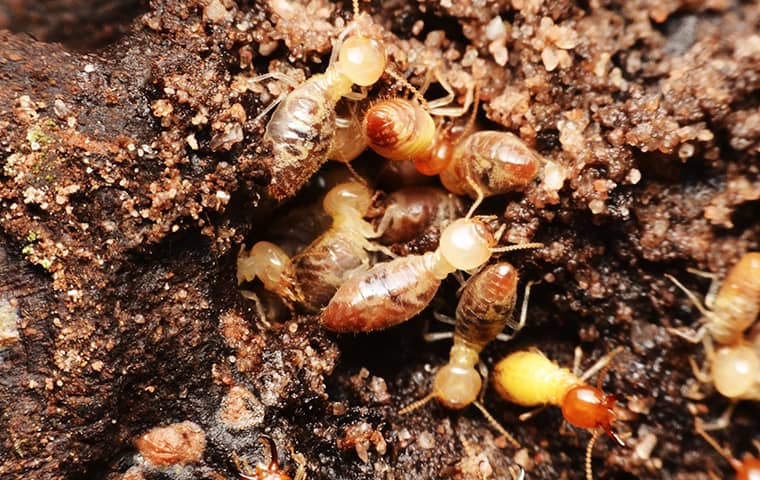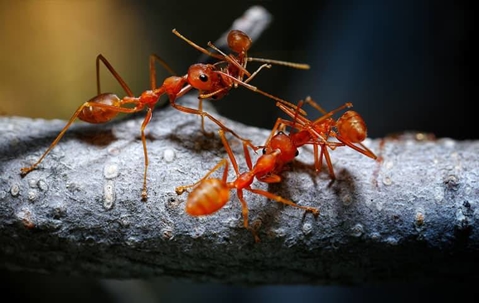Specialist Termite Control Services: Guard Your Home from Termite Damages
Specialist Termite Control Services: Guard Your Home from Termite Damages
Blog Article
Environmental Effect of Pest Control: Harmonizing Effectiveness With Sustainability
The environmental influence of pest control is a critical issue that requires a delicate equilibrium between achieving efficiency in making sure and taking care of bugs sustainability of our environments. As we strive to safeguard our crops, homes, and wellness from the hazards positioned by parasites, the techniques we utilize can unintentionally harm the atmosphere. From making use of hazardous chemicals that permeate right into our soil and water to the unexpected consequences on non-target types, the effects of conventional bug control techniques are far-reaching. There are arising methods that use hope for a more lasting method to pest monitoring. These solutions not only aim to deal with the immediate insect troubles however additionally consider the lasting wellness of our planet.
Damaging Chemicals in Parasite Control
The application of dangerous chemicals in parasite control presents considerable environmental and wellness threats that necessitate cautious consideration and mitigation methods. Chemicals, herbicides, and insecticides are frequently used to eliminate bugs, but their widespread application can result in unexpected effects. These chemicals can infect dirt, water sources, and the air, influencing not just the targeted parasites however likewise helpful bugs, wild animals, and human beings.

To deal with these dangers, incorporated insect management (IPM) techniques are being promoted as a more lasting option. IPM involves a mix of methods such as biological control, habitat manipulation, and the targeted use of pesticides as a last hotel (ant control apex nc). By adopting an alternative technique to pest control, we can decrease the environmental and wellness influences related to harmful chemicals while successfully managing pest populaces
Effect On Non-Target Variety
Considering the unplanned effects of bug control approaches, the influence on non-target species is a vital element that requires thorough evaluation. While insect control steps aim to target specific insects, various other organisms in the environment might be inadvertently impacted. Non-target species, including advantageous insects, birds, mammals, and also plants, can experience indirect or direct injury from chemical applications or organic control methods.
Insecticides created to deal with a specific insect pest may damage pollinators like bees or natural predators such as ladybugs. Biological control agents, if not species-specific, can pose risks to unintentional targets, interfering with the environmental balance.
To mitigate the impact on non-target types, integrated insect administration (IPM) strategies that highlight a holistic technique to pest control are recommended. These approaches prioritize making use of environmentally friendly methods, reducing damage to beneficial microorganisms while effectively handling pest populations. Conducting complete risk analyses and keeping track of the end results of bug control efforts are necessary action in guarding non-target types and promoting overall ecosystem wellness.
Dirt and Water Contamination
Unplanned environmental repercussions of insect control approaches extend beyond affecting non-target species, with substantial implications for soil and water contamination - termite control services. Chemicals, herbicides, and chemical fertilizers utilized in pest control can leach right into the soil and infect groundwater, presenting a risk to both water and terrestrial ecological communities.
Water contamination is one more crucial problem linked with pest control methods. Drainage from farming areas treated with pesticides can carry these chemicals into close-by water bodies, influencing marine microorganisms and water quality. Pollutants in water sources can have significant repercussions, influencing not only aquatic life yet also human health and wellness with the intake of infected water or marine organisms. To reduce dirt and water contamination from parasite control activities, incorporated pest monitoring techniques that focus on sustainability and minimize chemical inputs are crucial.
Air Contamination From Chemical Usage
Direct exposure to air-borne chemicals during farming applications presents a significant issue for air pollution control actions. They can volatilize right into the air and kind unpredictable natural compounds (VOCs) and various other air-borne contaminants when pesticides are splashed onto crops - termite control services. These chemicals can add to the formation of ground-level ozone, a major component of smoke that can have detrimental effects on human health and wellness, plant efficiency, and total air top quality. Furthermore, chemical drift, where pesticides are brought by the wind to unintended areas, can bring about the contamination of close-by ecosystems and water bodies.

Techniques for Sustainable Insect Control
In the world of farming practices, applying sustainable pest control approaches is critical for maintaining environmental equilibrium and securing plant returns. Lasting bug control stresses the use of ecologically friendly approaches to manage parasite populaces successfully while decreasing harm to non-target organisms and environments. Integrated Pest Management (IPM) is a commonly adopted method that combines biological, cultural, physical, and chemical control methods to attain lasting parasite administration solutions.
Crop turning and diversity are also efficient methods to interrupt pest life cycles and develop much less positive problems for pests to thrive. Ultimately, by integrating these sustainable bug control methods, farmers can achieve a balance between pest monitoring efficiency and ecological stewardship.
Verdict
Finally, the environmental effect of insect control techniques should be meticulously considered to stabilize effectiveness with sustainability. Dangerous chemicals made use of in insect control can bring about dirt and water visit this page contamination, air contamination, and harm non-target types - termite control services. It is important to carry out sustainable bug control techniques to minimize these adverse effects on the setting and promote a healthier community for future generations
By taking on an alternative technique to pest control, we can minimize the ecological and wellness influences connected with dangerous chemicals while efficiently handling pest populations.

To minimize the air contamination created by pesticide use, it is necessary to embrace incorporated parasite administration strategies that focus on the use of non-chemical insect control methods, such as plant turning, all-natural killers, and immune crop varieties. Lasting insect control highlights the usage of ecologically pleasant approaches to handle insect populations efficiently while decreasing harm to non-target organisms and ecological communities. Integrated Pest Management (IPM) is a widely adopted approach that integrates biological, social, physical, and chemical control approaches to accomplish lasting parasite monitoring services.
Report this page